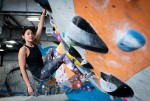The most important lesson Alice Kao learned from rock climbing was how to fall down, she said.
Kao, a UCLA alumna, founded Sender One Climbing in 2012 with co-founders Wes Chu and Wes Shih based on shared principles of self-discovery and a goal of connecting with others through climbing. She will return to UCLA on Tuesday for a Fireside Chat in Carnesale Commons hosted by Startup UCLA, where she will discuss her own entrepreneurship and successes with students. Kao said she hopes to help students understand how best to use resources at UCLA to discover their passions – similar to how she said climbing with others helped her build skills and learn about herself after a rough break up. Kao learned that failure is a necessary part of success, and said she had to learn how to fall down and get back up in life and in climbing.
“When I went to the climbing gym, I found my community,” Kao said. “I just found these really nice people that talked to me about climbing, and they didn’t judge me for who I was, and they didn’t talk to me about my terrible breakup or why I moved halfway across the world – and that was wonderful.”
Kao said her advice for students is to remember that it can be difficult at 18 or 21 to decide what they want to do with their lives at 40. She said she wants UCLA students to continue exploring and move past the fear of change.
Kao has experienced switching gears throughout her life, including swapping one career as an investment banker for entrepreneurship and opening a gym. Climbing, she said, helped her develop the ability to take more risks without fear of failure.
Wes Shih, Kao’s husband and a Sender One co-founder, said he experienced a second honeymoon with climbing when he helped open the gym. Apart from fostering a sense of community and trust among climbers, Shih said climbers typically share core values. One of these values is understanding the importance of protecting the areas related to their interests, such as Joshua Tree National Park, where Shih began outdoor climbing. He said trust is another significant aspect of climbing, because both indoor and outdoor climbing requires people to put faith in their climbing partner, who is responsible for belaying and giving rope that matches their partner’s speed and movements.
Climbing also is an effective method of practicing mindfulness because the risk encourages a deeper sense of awareness of one’s body and surroundings, Shih said.
The capacity for improvement lies in understanding that time is a valuable resource, something he said he and Kao both gained from climbing.
“Time is very important and you have to draw boundaries over it because you have a finite amount. I think climbing helps people discover that,” Shih said. “There are times when time just disappears, like when you get on the wall, if you’re distracted, then you’re not going to climb very well.”
Kao also said when she’s climbing, she has to remain present in the moment by focusing on herself and her immediate experience, which helps her block out stressors in other areas of her life, such as running a business and raising her two kids.
Many climbers focus on the mental aspects of the sport and the ways they connect to each other, said Charles Landis, who has been a member at Sender One for six years. A clear and focused mindset is necessary during climbing, he said, and sometimes simply talking through the route with others involved can help improve a climber’s mental state.
The lessons Landis learned from working through climbing routes are applicable elsewhere, too, he said. He said climbing helped him better work out ways to overcome his fears both on the wall – such as his fear of heights – and in everyday life, such as preparing for difficult conversations with others.
Kao tried a lot of different team sports in her time at UCLA, but she said nothing stuck until after she finished school and found climbing, where she learned how to fail and continue working toward her goals. Kao said discovering climbing was a significant change in her life and transformed her into a better person.
“I climb because it reminds me of a happy time in my life, and it reminds me of a time that climbing made me better,” Kao said. “And that’s why I get on the wall – because when I’m climbing, the only thing I can focus on is me and the wall and everything else just gets tuned out.”
